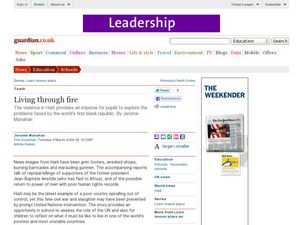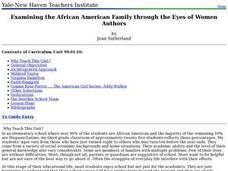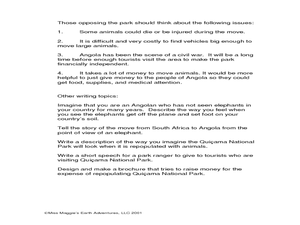PBS
Primary Source Set: Little Women by Louisa May Alcott
What did Jo write her stories with? How did the March sisters dress? A primary source set designed for Louisa May Alcott's Little Women prompts learners to look over images of household items and clothes from the 1860s before engaging in...
Curated OER
Bill of Rights
US history classes explore constitutional rights as they relate to court cases involving teens. Your class must already be familiar with the Bill of Rights before beginning this series of exercises. In preparation for a debate-style...
National First Ladies' Library
Riding the Underground Railroad
Young historians explore the underground railroad and life as a slave during the Civil War. After internet research, they discuss the hazards of travel as a slave and the benefits of freedom. Individually, students write a short story...
Beverly Hills High School
French Revolution Word Bank
Vive la résistance! Provide young historians with a list of important people and events during the French Revolution and Napoleonic periods.
Curated OER
The Solid South Switcharoo
Young scholars examine primary sources. In this lesson on political parties, students view historic documents, speeches, and photos to trace the rise and fall of particular political parties. Young scholars will be looking at the success...
Lessons on American Presidents
Abraham Lincoln
Honor Abe Lincoln with a set of activity-based worksheets that can be used independently and in collaborative groups. Young historians participate in a listening activity where they fill in the missing blanks in a passage while being...
Curated OER
Living and Working Now and Long Ago
Students visit an online museum and storybook to examine what life was like for African Americans during and after the Civil War.
Curated OER
Living Through Fire
Learners investigate the poverty found in Haiti. In this current events lesson, students research the noted Web sites to study Haiti's geography, history, and civil war.
Reading Through History
The Fugitive Slave Act of 1850
Why was the Fugitive Slave Act of 1850 so important? The reading in the resource discusses how the act affected Southerners, Northerners, and the slaves themselves. Scholars complete the reading as a form of direct instruction while...
Reed Novel Studies
Underground To Canada: Novel Study
Julilly dreams of freedom after being taken from her mother by a slave trader. Will she ever be free again? A resource focuses on the first chapter of Barbara Smucker's book Underground to Canada, and includes 10 vocabulary words,...
Curated OER
Major Types of Farming Operations in Antebellum Arkansas
Students read a handout about the types of farms in Antebellum Arkansas and respond on the worksheet. They answer an essay question on the topic.
Curated OER
Looking for Lincoln's Views on Slavery
Students reflect on Abraham Lincoln's views of slavery. In this United States History lesson, students analyze how things have changed in the United States over the course of their lifetime, then use this information as a comparison to...
Facing History and Ourselves
The Range of Choices
Learners examine crimes against human rights. For this world history instructional activity, students watch a segment of a video about the Armenian Genocide. Learners reflect on the crimes of the Ottoman government in classroom...
Curated OER
Before Dred Scott: Freedom Suits in Antebellum Missouri
Students examine and analyze original documents that enhance understanding of antebellum slavery in Missouri and a particular method of gaining freedom: the freedom suit.
Curated OER
Examining the African American Family through the Eyes of Women Authors
Students read stories by women authors on the characteristics of the African-American family. Using the internet, they research the history of issues that have affected African-American families from the Civil War to the Civil Rights...
Curated OER
The Underground Railroad
Pupils explore the Underground Railroad routes. In this map skills and Civil War instructional activity, students use map and globe reading vocabulary and skills to track the routes the slaves followed from the Bahamas to the United...
Curated OER
Pachyderms on Planes! The Amazing Angolan Ambassadors
Students investigate international aid by researching the history of Angola. In this world crisis lesson, students investigate the history, civil wars and poor economy of Angola and discuss ways to turn the poor nation around. Students...
West Virginia Department of Education
Declarations and the Quest for Life, Liberty and the Pursuit of Happiness
Understanding how John Brown got his inspiration from the Declaration of Independence helps learners further understand both West Virginia and United States history. The resource, a standalone, uses worksheets, discussion, and essay...
Curated OER
Lincoln's Spot Resolutions
Students take a closer look at historical relations between the United States and Mexico. In this Texas annexation lesson, students examine primary documents authored by Zachary Taylor, James Polk, and Abraham Lincoln to consider why the...
VH1
Lessons for Hight School Music Classes: Lesson 2
Art and music have been vehicles for statements of civil unrest for hundreds of years. Upper graders critically analyze several pop songs or music movements from the 1980s that exemplify politically charged motives. They analyze lyrics...
Curated OER
Defining Moments From the Past: Japanese American Internment
Students conduct a mock Congressional Hearing to decide whether or not Japanese Americans who were sent to internment camps during World War II should be provided financial restitution. They research and create a time line of events...
Smithsonian Institution
Watching Crystals Grow
Amazing science can sometimes happen right before your eyes! The class gets cozy as they watch crystals grow. They use Epsom salts, rocks, and food coloring to create crystals. They'll observe the entire process, documenting every step...
Curated OER
An Eye for an Eye
Students watch a view introducing them to modern Indian History. During the film, they answer discussion quesitons and discover the concept of non-violent civil disobedience. They share their responses with the class and write an essay...
Curated OER
Only 48 Hours
Students compare and contrast experiences of Les Aigner in Hungary and Kennie Namba in Oregon in being forced to relocate to concentration camps during WWII, and explore personal and social effects of prejudice, discrimination,...

























